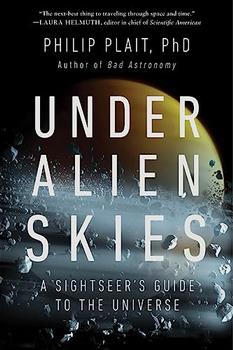Summary | Excerpt | Reviews | Beyond the Book | Readalikes | Genres & Themes | Author Bio

A Sightseer's Guide to the Universe
by Philip Plait
That's because of the gravity of the situation. The gravity you feel standing on the surface of some object—whether it's an asteroid, a moon, a planet, or a neutron star—depends on how much mass it has and its size. The Moon is about a quarter Earth's size and one-eightieth its mass. This works out to a surface gravity on the Moon that's about one-sixth the gravity of Earth.
Check your scale and do the math: If you weigh as much as an average adult human on Earth, you'll find you weigh 20 to 30 pounds on the Moon. That's about what a three-year-old weighs on Earth. So you, presumably a fully adult person (or on your way there), will find yourself weighing 5/6 less than you did on Earth.
It'll feel pretty odd. If you've ever been on a roller coaster, an airplane, or even an elevator, you've felt both higher and lower gravities. But that was for short periods, probably just seconds. Standing on the Moon would be a constant thing, always being one-sixth your Earthly weight.
So, just being there will be an unsettling experience. Walking normally will be impossible. You're used to walking in a way that supports your weight against Earth's gravity pulling you down. Because the gravity is weaker on the Moon, if you walked the same way, you'd be exerting far more force than you need—or want. Every time you took a step you'd launch yourself up off the surface. The weaker gravity also means that it takes you longer to complete a single stride, since it takes more time to go up and then back down during each step. You'll have to adjust the force you apply and the timing of your gait.
The Apollo astronauts, training for their Moon walks and again when they actually got there, found that a sort of sliding shuffle was the best way to get around. It was a compromise between walking and jumping and used the least amount of energy, since moving around in the bulky spacesuits was very tiring.
If you drop something it will fall more slowly; but reach for it and you'll likely overshoot, moving as rapidly as you're used to on Earth. That will take some time to adjust to. Newbies will probably overreact to such things many times before becoming accustomed to the lower gravity.
You'll also have to contend with the difference between mass and weight—ordinarily an academic point here on Earth. Your mass is the amount of stuff in you and as such remains the same wherever you are, but your weight depends on the gravity you feel. So while you'd weigh much less and feel lighter on the Moon than you do on Earth, you'd have the same mass and therefore the same amount of inertia, or resistance to a change in your speed or direction. This means that if you were moving rapidly, it would take the same amount of force to slow yourself to a stop as it would on Earth. It would feel like it should take less because you weigh less—but inertia depends on mass, not weight. If you saw something cool on the surface and decided to run toward it, slowing yourself would be deceptively hard, and you'd likely overshoot your mark—and probably take a tumble in the process.
But over time you'd become accustomed to it. Moving more slowly and deliberately would feel natural, and you would soon get your lunar legs.
Still, that's only step one—literally.
Excerpted from Under Alien Skies: A Sightseer's Guide to the Universe by Phillip Plait. Copyright © 2023 by Phillip Plait. Used with permission of the publisher, W. W. Norton & Company, Inc. All rights reserved.
Your guide toexceptional books
BookBrowse seeks out and recommends the best in contemporary fiction and nonfiction—books that not only engage and entertain but also deepen our understanding of ourselves and the world around us.